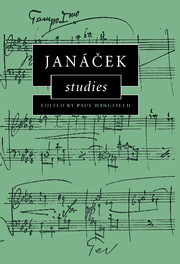Book contents
- Frontmatter
- Contents
- Preface
- 1 Expressive sources and resources in Janáček's musical language
- 2 ‘Nothing but pranks and puns’: Janáček's solo piano music
- 3 Narrative in Janáček's symphonic poems
- 4 Evasive realism: narrative construction in Dostoyevsky's and Janáček's From the House of the Dead
- 5 Direct discourse and speech melody in Janáček's operas
- 6 Kundera's eternal present and Janáček's ancient Gypsy
- 7 Janáček's folk settings and the Vixen
- 8 Janáček's operas in Australia and New Zealand: a performance history
- 9 Janáček's Moravian publishers
- 10 Janáček, musical analysis, and Debussy's ‘Jeux de vagues’
- Index
6 - Kundera's eternal present and Janáček's ancient Gypsy
Published online by Cambridge University Press: 22 September 2009
- Frontmatter
- Contents
- Preface
- 1 Expressive sources and resources in Janáček's musical language
- 2 ‘Nothing but pranks and puns’: Janáček's solo piano music
- 3 Narrative in Janáček's symphonic poems
- 4 Evasive realism: narrative construction in Dostoyevsky's and Janáček's From the House of the Dead
- 5 Direct discourse and speech melody in Janáček's operas
- 6 Kundera's eternal present and Janáček's ancient Gypsy
- 7 Janáček's folk settings and the Vixen
- 8 Janáček's operas in Australia and New Zealand: a performance history
- 9 Janáček's Moravian publishers
- 10 Janáček, musical analysis, and Debussy's ‘Jeux de vagues’
- Index
Summary
It is well known and will doubtless become part of operatic lore that there was a real live death at the 1996 Metropolitan Opera premiere of Janáček's Věc Makropulos (The Makropulos Affair; 1923–5). The tenor playing the lawyer's clerk Vítek, Richard Versalle, fell off the ten-foot ladder on to the Met stage after singing the words ‘One should not live so long’. Actually the Czech ‘Nic netrvá věcně’ is better translated as ‘Nothing lasts for ever’. The response of the audience, of course, was a kind of hushed disbelief and shock. I received many telephone calls in the following days from people who had been completely traumatised by the event. Some blamed the Met for having the actor up so high, others simply shuddered.
Nothing could more easily illustrate the line between illusion and harsh enactment, or between realism and reality, making it abundantly clear that it is the former audiences wish to see, never the latter. The reasons for this are not necessarily self-evident. After all, Janáček's Makropulos deals quite specifically with issues of life and death. Could it not be argued that such an unpredictable event allows the spectator to have an even deeper experience, to reflect more profoundly on the transitory nature of existence? Would it be heartless for even a Janáček lover to say: ‘The death of the tenor moved me even more deeply than any performance of the opera’? No one has come forward and suggested either in this case.
There was another striking phenomenon.
- Type
- Chapter
- Information
- Janácek Studies , pp. 109 - 126Publisher: Cambridge University PressPrint publication year: 1999



